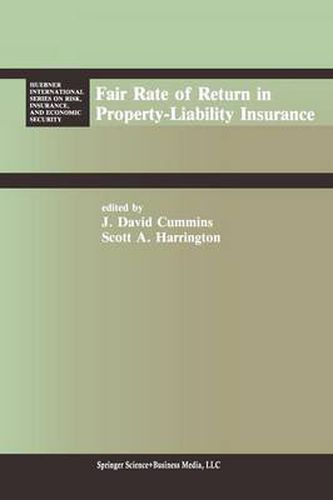Readings Newsletter
Become a Readings Member to make your shopping experience even easier.
Sign in or sign up for free!
You’re not far away from qualifying for FREE standard shipping within Australia
You’ve qualified for FREE standard shipping within Australia
The cart is loading…






This title is printed to order. This book may have been self-published. If so, we cannot guarantee the quality of the content. In the main most books will have gone through the editing process however some may not. We therefore suggest that you be aware of this before ordering this book. If in doubt check either the author or publisher’s details as we are unable to accept any returns unless they are faulty. Please contact us if you have any questions.
Property-liability insurance rates for most lines of business are regulated in about one-half of the states. In most cases, this me ans that rates must be filed with the state insurance commissioner and approved prior to use. The remainder of the states have various forms of competitive rating laws. These either require that rates be filed prior to use but need not be approved or that rates need not be filed at all. State rating laws are summarized in Rand Corporation (1985). The predominant form of insurance rate regulation, prior approval, began in the late 1940s following the V. S. Supreme Court decision in United States vs. South-Eastern Underwriters Association, 322 V. S. 533 (1944). This was an anti trust case involving one of four regional associa tions of insurance companies, which constituted an insurance cartel. The case struck down an earlier decision, Paul vs. Virginia, 8 Wall 168 (1869), holding that the business of insurance was not interstate commerce and hence that state regulation of insurance did not violate the commerce clause of the V. S. Constitution. Following South-Eastern Underwriters, the Vnited States Congress passed the McCarran-Ferguson Act, which held that continued state regulation and taxation of insurance was in the public interest. The act also held that the federal antitrust laws would not apply to insurance to the extent that the business was adequately regulated by state law. (See V. S. Department of Justice 1977.
$9.00 standard shipping within Australia
FREE standard shipping within Australia for orders over $100.00
Express & International shipping calculated at checkout
This title is printed to order. This book may have been self-published. If so, we cannot guarantee the quality of the content. In the main most books will have gone through the editing process however some may not. We therefore suggest that you be aware of this before ordering this book. If in doubt check either the author or publisher’s details as we are unable to accept any returns unless they are faulty. Please contact us if you have any questions.
Property-liability insurance rates for most lines of business are regulated in about one-half of the states. In most cases, this me ans that rates must be filed with the state insurance commissioner and approved prior to use. The remainder of the states have various forms of competitive rating laws. These either require that rates be filed prior to use but need not be approved or that rates need not be filed at all. State rating laws are summarized in Rand Corporation (1985). The predominant form of insurance rate regulation, prior approval, began in the late 1940s following the V. S. Supreme Court decision in United States vs. South-Eastern Underwriters Association, 322 V. S. 533 (1944). This was an anti trust case involving one of four regional associa tions of insurance companies, which constituted an insurance cartel. The case struck down an earlier decision, Paul vs. Virginia, 8 Wall 168 (1869), holding that the business of insurance was not interstate commerce and hence that state regulation of insurance did not violate the commerce clause of the V. S. Constitution. Following South-Eastern Underwriters, the Vnited States Congress passed the McCarran-Ferguson Act, which held that continued state regulation and taxation of insurance was in the public interest. The act also held that the federal antitrust laws would not apply to insurance to the extent that the business was adequately regulated by state law. (See V. S. Department of Justice 1977.